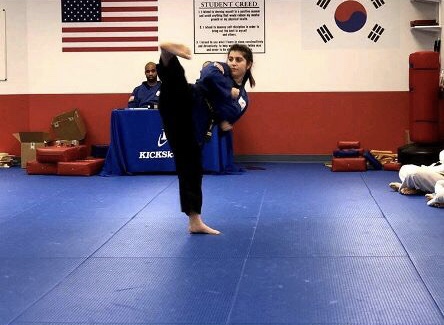Karate fosters self-defense and increases exercise

Senior Zoe Joy uses karate as a form of exercise and a way to learn self-defense. She has battled multiple injuries, but remains involved in the sport.
February 8, 2019
WCHS does not offer karate as a class or an extracurricular activity, but that does not stop students like senior Matthew Dilsizian from pursuing the sport during their free time.
Dilsizian began karate when he was in fourth grade.At first, he had trouble keeping up with the other students in the class. However, he was able to overcome the obstacles by getting into better shape and building up strength.
“When I first started, I was pretty out of shape and had a hard time keeping up,” Dilsizian said. “Needless to say, I had to put aside a great amount of time to get into better shape and accomplish the instructor’s lessons.”
During the classes, Dilsizian realized that while he is not the strongest, fastest or most flexible, he did not give up the lessons, and he instead devoted his time to push himself further to be successful.
“I have a strong will to push myself to keep going even at the brink of collapsing from exhaustion,” Dilsizian said. “In fact, the phrase ‘never give up’ is always on the dojo wall as a reminder to the students.”
Dilsizian, a first-degree black belt, praises his devotion towards practicing the moves and attending class often for his success. Eventually, he plans to test for his second degree.
“Going to class is especially important for sparring competitions,” Dilsizian said. “I train for my competitions by going to class more often and practicing what I learned when I get home.”
Karate requires more than just the physical moves. Students learn how to use several instincts or skills that they can build upon and apply while doing the moves.
“My most important instinct I apply is reflexes,” Dilsizian said. “The skills I find useful are balancing, mental focus, self-control, self-discipline and pushing yourself to improve.”
Senior Zoe Joy chose to practice karate to improve her self-defense skills and boost her confidence. She uses karate as a form of working out and exercising to get in shape.
“During karate, I apply my strength and confidence in order to control my reflexes and be successful in executing the moves correctly,” Joy said.
Like Dilsizian, Joy overcame a difficult obstacle along her journey to achieve her goal of third-degree black belt. Despite the injuries she sustained, Joy recovered and immediately came back to sparring, training towards achieving her goal.
“I sprained my foot very badly about 10 years ago,” Joy said. “I healed up and came right back to training. I also had surgery for another health issue, but like the first obstacle, I trained as soon as I could with the goal of third degree black belt in my mind.”
One of Joy’s weaknesses is that she does not have a significant amount of power for sparring and her jump kicks. However, she makes up the gap with her strengths of a strong fighting stance and good technique which she develops in her training.
“I go as many days as I can to train and when I cannot go to the class, I practice at home, sleep well and try to eat healthy,” Joy said.
Karate can be a daunting new sport for those students who are new to martial arts and sparring. Even so, Joy advises students to never give up and leave the sport just because it was too difficult.
“My advice for students who wish to do karate is do not quit just because the black belt seems too far away,” Joy said. “You will regret it.”
Likewise, Dilsizian recommends students give karate a chance.
“By encountering many different people with different styles who all worked very hard, you will take something valuable away from the experience and be better at karate because of it,” Dilsizian said.
Dilsizian developed useful and important skills in karate that he credits as the reason for his successes and being able to apply them in his daily life.
“Being taught self-discipline is one of the most important skills to develop and apply in your life after starting karate,” Dilsizian said. “Your ability to work, study, practice sports,and just about every other aspect of your life depends on this.”

